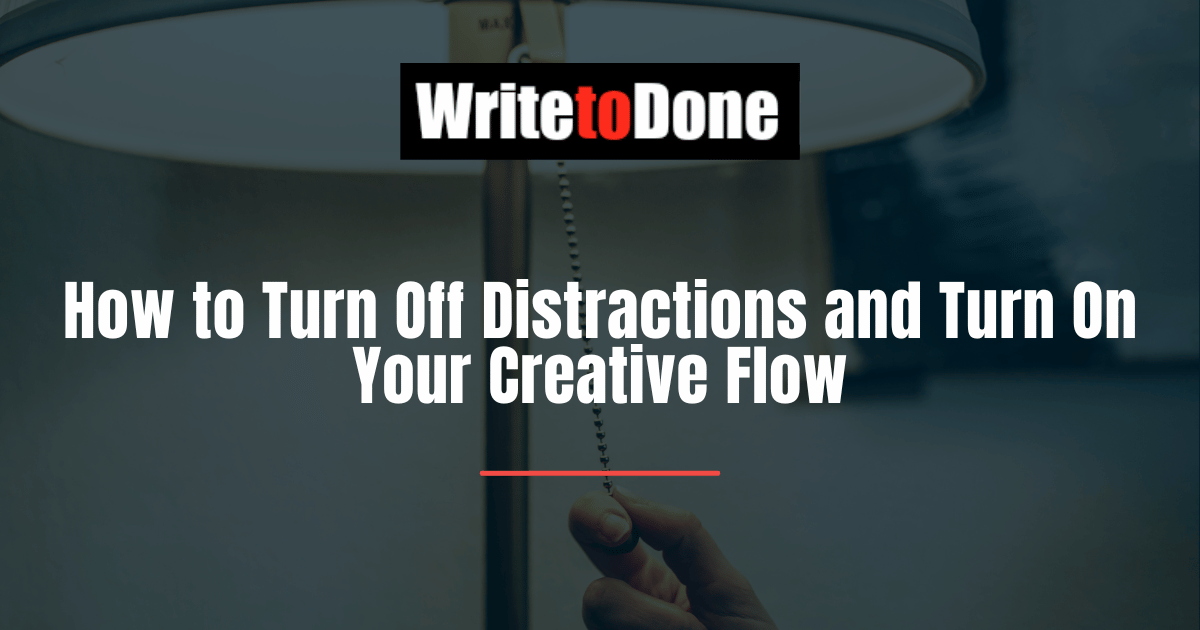There are millions of distractions that the modern day writer has to put up with in order to get their ideas out there. Twitter, Facebook, email, they’re all conspiring to distract you from getting your writing down on the page.
Did you know, when you’re multitasking between writing and doing something else, it can take up to thirty minutes to get your mind back on track? Flip-flopping between activities is not an option for a writer who’s trying to get some writing done.
This is why I subscribe to a method of pure writing flow. It’s one of the many ways that I use to counter the background noise bubbling up from every direction.
What is flow? It’s kind of like a river of writing, it’s an uninterrupted stream of consciousness directly from the source of your creativity through your brain, into your nervous system, out your hands, into your computer. I like to think of it as zen writing meditation.
There is some important prep work that needs to be done before you’re ready for some serious writing flow time:
1, Isolate yourself.
Shut the door to your study, turn off your cell phone, turn off your email program, shutdown your Twitter. Make note of any other things that I haven’t mentioned here that could possibly distract you from entering the flow. Make sure they can’t beep, howl, vibrate or demand anything from you.
2, Just you and computer.
I write with a program called WriteRoom, which turns my Mac into a tool for simply writing. A simple text editor will work as well. This way it’s just me and the words I type, nothing more. There’s no jumping dock icons grasping my attention, it’s just me and the writing. This is important, because it’s so easy to open Firefox and get lost in the internet. Sometimes if I find that WriteRoom isn’t enough isolation, I’ll turn off the internet altogether.
3, Don’t start writing, yet.
Take a moment and center yourself. I usually do around fifteen minutes of quiet contemplation before I even start touching keys. Focus on the idea that you have, but not too hard, just enough to see a vague outline of what you want to achieve. Why? Because this gives my mind a chance to let everything else in the world go, and just focus on the task at hand: writing.
And now it’s time to write, let the worlds spill out of you onto the page, and trust that they’re okay. There are moments in every creative’s life when they tap into the source of their creativity and they’re able to ride that creativity unto a finished project. With this writing philosophy I’m trying to get at that creative source.
Don’t edit yourself.
While you’re flowing, it’s important not to go back and edit things that you may have screwed up. Accept that you spelled miscellaneous wrong, and realize that you’ll be able to go back and fix that after you’re done. You’ll be able to rearrange paragraphs, after your flow is complete. If you stop and fix these things now, you’ve broken the stream of thought and you’ll have to start from scratch.
The time to edit yourself, to second guess what you did, is after your flow is over. When your copy has gone the full life-cycle from conception to being fully typed on the page.
Don’t second guess yourself.
You might be looking at the words coming out of you, and saying ‘wow, this absolutely crap.’ ignore that little voice. It’s trying to sabotage your writing, if you stop and delete what you’ve put out now, you’ll never get to the next sentence, which will inevitably be more brilliant than the one you’re writing now.
The important part is to bypass your inner critic and editor, as they’re conspiring to destroy your ability to get your ideas down on the page.
Keep the pace.
Imagine flowing like kayaking down stream a moving river, but you’re not the boater, you’re the kayak. No matter what happens, even if the person in control stops paddling for a bit, you’re going to keep going. The words will keep coming out of you and out onto the page, until you’ve reached the place where you pull the boat out of the water.
There are several other art forms that tap into spontaneous flow.
MCing is one of these art forms, rappers commonly tap into a stream of consciousness, a process that bypasses any second guessing. The words are moving so quickly out of a rapper’s mouth that they don’t really have time to pre-formulate those words.
Improv dance is another art form that involves tapping into flow. The dancer simply moves spontaneously to the music without any pre-choreographed movements. One of the goals in improv is to bypass the inner critic and just do the first physical action that drops into
your mind. This same philosophy can apply to writing.
Like any skill, flow takes practice to master.
Some people will be better at it initially than others. Don’t judge yourself if your inner critic is screaming at you to stop writing, just acknowledge that it’s there, and with time you can learn to ignore it and just write with the pure energy of your thoughts. Try flowing for short periods of time initially, maybe twenty minutes? And then gradually build on that time frame.
Eventually you might be able to do an hour of free flow writing, or imagine being able to flow for six hours straight? You’d be able to write tens of thousands of words, wouldn’t that be amazing?
Image courtesy of Pixabay
















